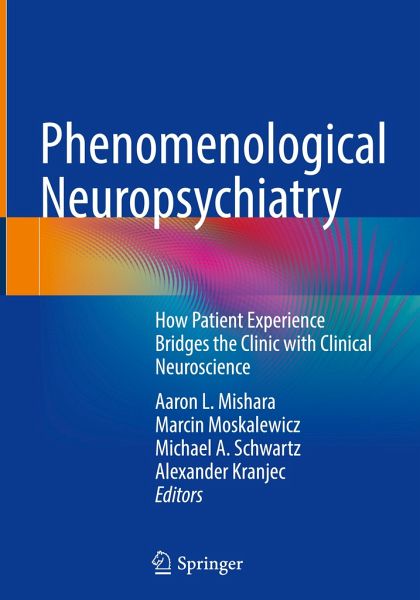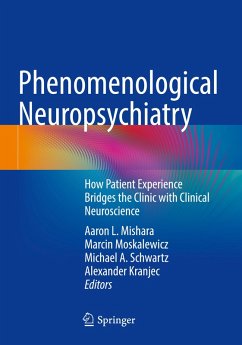
Phenomenological Neuropsychiatry
How Patient Experience Bridges the Clinic with Clinical Neuroscience
Herausgegeben: Mishara, Aaron L.; Moskalewicz, Marcin; Schwartz, Michael A.; Kranjec, Alexander

PAYBACK Punkte
75 °P sammeln!
This innovative book offers a multidimensional exploration of the epistemological foundations of psychiatry and its major disorders. By emphasizing the importance of phenomenology in unravelling the intricate interplay between basic categories of human experience and neurobiological processes, it advocates for a shift in both psychiatric research and clinical practice. Phenomenological Neuropsychiatry presents psychiatry as a hybrid discipline that synthesizes subjective mental experiences with objective neuroscientific findings and forms an integrative and interdisciplinary structure that pro...
This innovative book offers a multidimensional exploration of the epistemological foundations of psychiatry and its major disorders. By emphasizing the importance of phenomenology in unravelling the intricate interplay between basic categories of human experience and neurobiological processes, it advocates for a shift in both psychiatric research and clinical practice. Phenomenological Neuropsychiatry presents psychiatry as a hybrid discipline that synthesizes subjective mental experiences with objective neuroscientific findings and forms an integrative and interdisciplinary structure that provides a dialectical bridge between understanding, compassion, and explanation.
The first section of the book presents the lived experience of psychosis and argues for a more inclusive approach to mental health issues. The second section examines the ways in which psychiatric knowledge is constructed and the unique challenges posed by combining understanding and explanation of mental disorders. Section three sheds light on how disruptions in bodily experiences, memory processes, and self-perception can contribute to the development and manifestation of psychiatric issues. The following section discusses disorders of mood and anxiety, including the phenomena of depression, obsessions, and depersonalization. The fifth and final section provides an in-depth examination of psychotic disorders. It covers a range of topics, such as timing, intentionality, self-monitoring of action in schizophrenia, and the neurobiology of prodromal psychosis. As a singular work dedicated to revitalizing and advancing cross-fertilization between psychiatry and phenomenology, this groundbreaking book clears the foggy operationalized clusters of mental symptoms that may obscure diagnosis and treatment and argues for systematic integration of patient subjectivity and collaboration in clinical research. It features an authorship of the leading clinicians and thinkers from throughout the world in psychiatry, psychology, neuroscience, social sciences, and philosophy. Phenomenological Neuropsychiatry: How Patient Experience Bridges the Clinic with Clinical Neuroscience is a major contribution to the clinical literature and a must-read for psychiatrists, neurologists, psychologists, and professionals and students from other disciplines concerned with absorbing a deeper understanding of psychiatric disorders.
The first section of the book presents the lived experience of psychosis and argues for a more inclusive approach to mental health issues. The second section examines the ways in which psychiatric knowledge is constructed and the unique challenges posed by combining understanding and explanation of mental disorders. Section three sheds light on how disruptions in bodily experiences, memory processes, and self-perception can contribute to the development and manifestation of psychiatric issues. The following section discusses disorders of mood and anxiety, including the phenomena of depression, obsessions, and depersonalization. The fifth and final section provides an in-depth examination of psychotic disorders. It covers a range of topics, such as timing, intentionality, self-monitoring of action in schizophrenia, and the neurobiology of prodromal psychosis. As a singular work dedicated to revitalizing and advancing cross-fertilization between psychiatry and phenomenology, this groundbreaking book clears the foggy operationalized clusters of mental symptoms that may obscure diagnosis and treatment and argues for systematic integration of patient subjectivity and collaboration in clinical research. It features an authorship of the leading clinicians and thinkers from throughout the world in psychiatry, psychology, neuroscience, social sciences, and philosophy. Phenomenological Neuropsychiatry: How Patient Experience Bridges the Clinic with Clinical Neuroscience is a major contribution to the clinical literature and a must-read for psychiatrists, neurologists, psychologists, and professionals and students from other disciplines concerned with absorbing a deeper understanding of psychiatric disorders.












